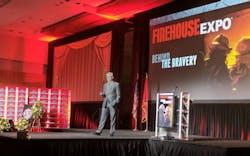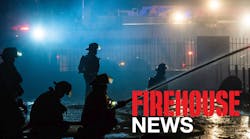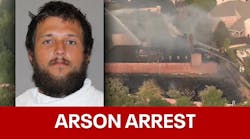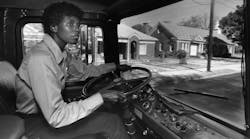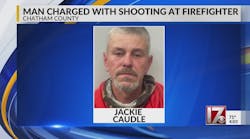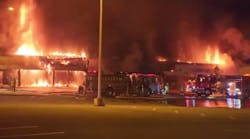While the business of fighting fire and saving lives is one of courage, the notion of being courageous enough to go behind the bravery is the theme of this year's Firehouse Expo in Nashville.
Following a tear-filled and emotional opening address delivered by Firehouse Editor-in-Chief Tim Sendelbach about recently passed fire service pioneer Alan Brunacini, FDNY Capt. John Ceriello offered a challenging keynote address entitled "Pulling Back the Curtain: A Cautionary Tale."
Ceriello is a 29-year firefighting veteran who has spent 14 of his service years in FDNY's Special Operations Command and helped introduce stairwell pressurization, wind control devices and high-rise nozzles into the field.
In his lively and engaging New York accent, Capt. Ceriello challenged the firefighters in attendance and watching live on social media to have the necessary bravery to pull back the curtain on their own knowledge and training in order to become the best firefighter and public servant they can be.
A career begins
Ceriello began with a tale of a young firefighter who followed in his father's footsteps and began his career in the fire service as a volunteer in his hometown "wanting to grab the bull by the horns and do the right thing."
"He was fully committed and really got involved in learning as much as he could," Ceriello said.
That firefighter eventually got on the job with a big city department and later realized around the seven-year mark that he thought he knew how to fight fires and save lives, developing a swagger around his training and knowledge. But a series of line-off-duty deaths in a short period of time coupled with an opportunity to transfer to another house and learn more began to change his outlook.
"Now he starts thinking, 'Where do you go from here? What does this all mean?' So he had some choices. 'Do I embrace this new information? Do I try to wrap my head around it? Do I try to understand it? Or push it away?'"
The concern became whether his desire to increase his knowledge would put him at odds with established tactics and standard operating procedures or in opposition to his brother firefighters and their approach.
"It was a major dilemma."
The elephant in the room
Ceriello contends that one of the largest obstacles standing in the way of the fire service moving into the future can sometimes be the human element -- the firefighters themselves. New ways of thinking about fireground tactics need to be discussed and embraced in an industry that prides itself on bravery, honor and tradition.
Ceriello understands the difficulty in moving forward because he admits that he was once "one of those guys."
"I was taught by officers who went through the war years," Ceriello said, referring to New York City in the 60s and 70s when fires were rampant throughout the city. "We were still wearing three-quarter boots and leather helmets. I can remember being taught an aggressive concept of fighting fires: Get in there and put the fire out."
"And you know what? Sometimes it's not so pleasant, but that was my foundation. ... I grew up an old-school firefighter."
Then a trip to a training and research event in Ohio began to open his eyes to a whole new way of looking at fighting fires. Ceriello chose to step away and pull back the curtain on his approach, and he found that his knowledge was not where he believed it needed to be -- a realization that can shake a firefighter to his core.
"There were things that I should have known, but I didn't know. Two things happened inside me. One, I was curious. I wanted to know more. And two, I was a little pissed off. How at this point in my career -- I was a lieutenant with 15 or 16 years on the job -- and I didn't know some of these things that in other people's minds were pretty basic fire behavior concepts. How could that be?"
You, me, them and us
Instead of pulling back the curtain and finding that elephant in the room -- the issues and topics that modern firefighters won't discuss -- Ceriello wants firefighters to find that the whole fire service and the people it serves are behind the curtain and that firefighters need to help each other learn as much as they can and fight fires not aggressively but intelligently.
Coordinated attacks, door control and communication were concepts Ceriello repeatedly touched on. Since the fuel package has changed from the 60s to the 90s, the approach to controlling fires needs to change as well -- and he contends that it hasn't.
"We're kind of pre-wired to look at things a certain way. So if we've been doing something a particular way for a really long time, it must be better, right? That gets wired into us. And when we embrace something new, it's looked at like we're kicking something old to the curb. But maybe that's not the case."
Through his research into New York City line-of-duty deaths from 1950 until about 2010, Ceriello found that in the busiest years of firefighting in the Big Apple, he found only four firefighters who were burned to death in a fire. But when he looked at the numbers from 1985 to 2010, he found that about 17 firefighters died that way.
While Ceriello didn't make any bold statements as to why that happened, he believes it's because firefighters may have been taking unnecessary risks, because no civilians were killed in those fires. While he's not suggesting that firefighters remove the risk from their profession -- which is virtually impossible -- he calls it a "moral obligation" to take statistics like those to heart and address them.
"It doesn't mean you're not going into the building. It doesn't mean you're not going to do a risky job. ... Nowhere has that changed."
"You have to put aside your ego when you say 'This fire's not gonna lick us.' There comes a point where you have to draw the line. Our job is reacting to everything we're learning and saying we're going to tweak a few things here. It's not changing everything."
Behind the bravery
Ceriello also spent some time speaking about FDNY firefighter Ray Pfeiffer, a 9/11 responder who was stricken with cancer and died earlier this year. Pfeiffer made it his mission despite the toll his illness was taking to address the risks firefighters face in the service and to educate them on the best ways they can protect themselves and stay healthy.
"We want to be on the right side of history," Ceriello said.
Ceriello says part of pulling back the curtain and going behind the bravery is for firefighters to learn about and address cancer risks in a smart and humble way by properly cleaning and decontaminating their gear, among other approaches.
"I still see pictures of firemen back at the firehouse with black soot all over their face and smiling at the camera, and I get it. I get it. I come from that. But we have to start waking up and realize that the elephant in the room of cancer needs to be addressed. We have to attack it aggressively just like we attack everything else in the fire service."
